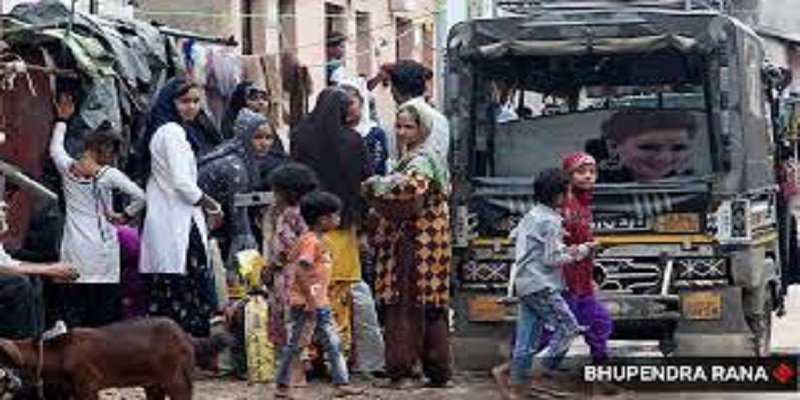
The heroic welcome and jubilation over their release has sent shockwaves among the Muslims living in Randhikpur. Several Muslim families have taken shelter at Rahi-mabad Relief Colony of Devgarh Baria taluka where Bilkis’ family is living since 2017
Team Clarion
NEW DELHI – Muslims living in the village namely Randhikpur where pregnant Bilkis Bano was gang-raped and her family members were massacred during 2002 communal violence, started leaving the village out of fear after rape and murder convicts were freed and accorded heroic welcome in Gujarat’s Dahod district.
Several Muslim families have taken shelter at Rahi-mabad Relief Colony of Devgarh Baria taluka where Bilkis’ family is living since 2017.
The eleven convicts, who were sentenced to life imprisonment for rape and murders, were released on 15 August by the Gujarat government under the state’s remission policy. After being released, the rapists and murderers were garlanded and welcomed with sweets.
The heroic welcome and jubilation over their release has sent shockwaves among the Muslims living in Randhikpur.
“There is fear among the community since last week… There have been no direct threats but the welcome they received and the sense of jubilation in the village… We grew anxious and left as we did not feel safe there. It was different when they came out on parole as we knew they were ultimately prisoners but now they have been released,” Sultana, a woman from the village, was quoted by Indian Express as saying.
She reached the relief colony along with her mother and sister on Sunday. The release of the convicts also revived the memory of Gujarat pogrom.
“The images of the horror are flashing in memory… Although we were lucky to have escaped then, we can’t trust the process now… None of us has the kind of courage that Bilkis has shown in the past two decades to fight. On our way here, we came across a huge convoy of the ruling party near Kesharpura and were petrified. I held on to my daughter tight,” said Sultana’s mother.
On Monday, members of the Muslim community also submitted a memorandum to the District Magistrate (DM) urging the state government to reconsider the remission decision. They are also seeking permission to hold a protest against the release of convicts.
Another villager, who is a maternal cousin of Bilkis, said the rape and murder convicts are roaming in the village which makes them feel insecure.
“Despite what they did to my sisters, aunt and others, they have been released… They have been roaming in the village and market areas and it is intimidating… I had no choice but to leave my house and shift to the relief colony with my wife and infant as I cannot take a chance,” he said.
Abdul Razzak, a resident of Randhikpur, said when the accused were convicted for rape and murder, people, who were living in the relief colony, had started returning the village to rebuild their life. However, the release of the convicts has shattered all their plans of rehabilitation.
Another villager, Sabera Patel Ghanchi, has left her home and arrived in Devgadh Baria. Sabera had filed an FIR against convicts, Radheshyam Shah and Mitesh Bhatt, along with Shah’s brother after they were involved in a fight in June 2017 when Radheshyam was on parole,
“I have a daughter and four grand-daughters. If they have been released, what is the guarantee that they won’t be emboldened to repeat the crimes? We do not have any security,” Sabera was quoted by Indian Express.
Sabera’s 2017 FIR resulted in a cross complaint from the convicts against her. The case is on trial at the local court.
The effect of the release of the convicts was also felt in Ahmedabad’s Naroda Patiya where 97 Muslims were massacred by rioters during 2002 anti-Muslim pogrom. The victims of Naroda Patiya were angry with what had happened with Bilkis Bano and with the Gujarat government for releasing the convicts.
Speaking about Bilkis’s case, the memory of violence was revived in their mind.
“We will never forget. They came in the dead of the night carrying stones, knives, sickles. They blasted our house by setting fire at the cooking gas outlet. Back then, there were fewer houses in the mohalla (colony) and so there were four or five ways out. We ran for our lives,” Hussaina Mansoori was quoted by The Print as saying.
Even now, Muslim residents of Naroda leave the area whenever communal tensions broke out in any part of the country.
“There has been no untoward incident here since the 2002 riots. But, it’s difficult to forget what happened back then. Every time there’s any threat of unrest anywhere in the country, some of us who have other homes in the state just move out for a few days,” Shireen, whose mother lives in Naroda, told ThePrint.

